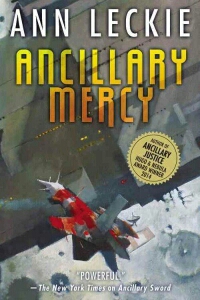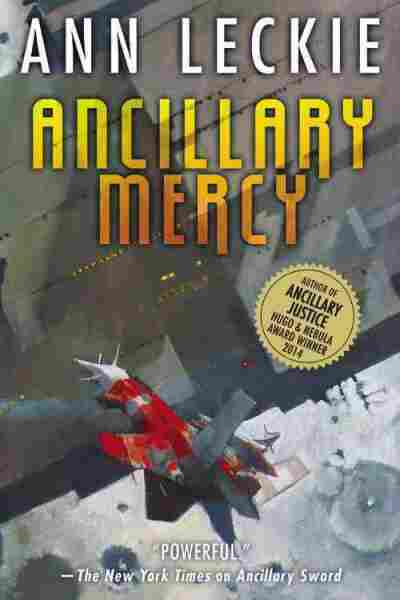

None of the events in this book, in contrast, really overstay their welcome. I wasn’t a huge fan of the lengthy quest structure of the first book, and while I enjoyed the second book’s plot, there were points where it started to drag. Of all the three books, this one also has the best pacing. Leckie’s worldbuilding is tightly-packed, and that’s very rewarding. There is a lot going on here, despite Ancillary Mercy being on the shorter end of novels. You could spend a lot of time just thinking about all the different ways Leckie signifies and symbolizes identity, from modes of dress to ethnic categories to language. And then there's the lovely zaniness of Translator Zeiat (who is not, as she first thought, Translator Dlique). Tisarwat is trying to pick up the pieces of herself following Anaander's imposition of her personality. Seivarden continues to deal with being so out of time.

Most of the main characters undergo similar transformations. Breq is special in that she is the first to actually ask the ships what they want.

It's not as simple as “ships are slaves” or “AIs are sentient and therefore need rights,” because the ships have been programmed to have certain desires (like wanting a crew and a captain). On a wider level, Leckie has Breq question the role that ships play in the Radch. Now in this book, everyone learns that Breq is an ancillary-just as she’s figuring out that she is more than an ancillary, or a fragment of a ship AI, but something different entirely. She finally comes to grips with that in Ancillary Sword, only to have to conceal her nature as an ancillary from everyone and pretend to be a human. In the first book, Breq had to struggle with feeling like she was still Justice of Toren but greatly diminished. Identity has been one of the longest-running motifs in this series, and it all comes to a head here. Indeed, Ancillary Mercy underscores the difficulty of reaching any kind of stability in the midst of a larger conflict. Breq has to think fast to save as many lives as possible, but it’s not easy to come up with a solution that will please everyone. A part of Anaander Mianaai that really hates her (as opposed to just mildly hating her) has shown up at Athoek and wants to take over the joint. Now an independent entity in her own mind, she strives to establish her identity. I'm all a-tingle!īreq has come a long way since she was just an ancillary of Justice of Toren. Now, suddenly, here we are at the conclusion of the trilogy with Ancillary Mercy. I enjoyed her debut novel for what it was-a ripping good story set in a universe with just enough originality to make it fun and familiarity to make it conceivable. It feels like just yesterday that Ann Leckie took the science fiction scene by storm with Ancillary Justice.


 0 kommentar(er)
0 kommentar(er)
